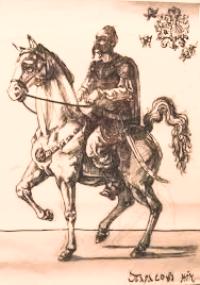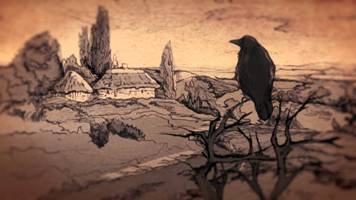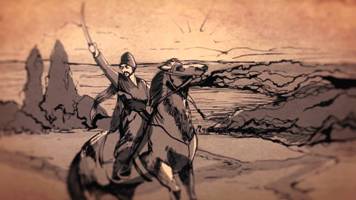The night of Taras (1)
("Tarasova nich")
To P.M.Martos (2)
A kobzar (3) at the crossroads sits
And plays to pass the hours;
Young men and women round him seem
 To bloom like poppy flowers.
To bloom like poppy flowers.
The kobzar plays and blithely sings:
In words the tale is taught
How Mongols, Poles, and Muscovites
Have with the Cossacks fought,
How early on a Sunday morn
A crowd has made a rally
To bury a young Cossack bold
Deep in a fair, green valley.
The kobzar sings so lustily
Misfortune seems to smile:
"There was a time when Hetmans (4) ruled—
Lost is that ancient style;
There was a time when we.were lords,
But gone are all those days...
Yet Cossack glory we recall
In never-ending praise...
O thou Ukraine, my own Ukraine,
Dear mother past belief,
When I recall thee, native land,
My heart is pained with grief!
What happened to our Cossack realm,
Its leaders red of cloak?
Where are our fate and freedom now,
The standards of our folk?
Where are they all? Consumed in flames.
Or did the wide blue sea
Drown all thy mountains in its depths,
Thy mounds'(5) sublimity?
The hills are mute; the sea roars on;
The mounds in sadness stand;
Over the Cossack's children now
There rules an evil band!
Roar then, O sea! Be mute, ye hills!
Blow, wind, across the plain!
Ye children of the Cossacks, weep!
Your destiny is vain!
"From Oman's (6) shore there lifts a cloud,(7)
Another from the plain:(8)
Ukraine is languishing in grief,
Her destiny is vain!
Like an abandoned child in woe
Our land must tearful lie.
Nobody comes to give her help...
The wearied Cossacks die;
The glory wanes, the land declines;
Where shall men turn for grace?
Unbaptized (9) up to manhood grow
The children of our race,
For out of wedlock men must live;
Without a priest they die;
Our faith to Jewry (10) has been sold
And locked our churches lie!
Like blackbirds covering a field,
The Poles and Uniates (11)
Come swooping down—to save us all
No word of counsel waits.
Then Nalivayko (12) raised his voice—
His tailor-band soon fled!
Cossack Pavliuha (13) next was heard—
But he in turn was sped!
Taras Triasilo then spoke out
With tears of bitter dole:
"Alas! Alack! My poor Ukraine
Is trampled by the Pole!"
"Taras Triasilo wagged his tongue—
Our true faith made him do it;
The dark-blue eagle raised his voice
And caused the Poles to rue it!
And thus did Pan (14)
Triasilo speak:
'Have done with grieving prattle!
Let us go forth, my trusty friends
And meet the Poles in battle!'
'Tor many a day and many a night
He carries on that war;
From Liman to Trubailo's (15) bank,
The plain is wet with gore.
The Cossack brave was wearied
And fell in deep despair;
The villain Koniecpolski (16)
Rejoiced with pleasure rare;
He gathered all the szlachta (17)
To revel in delight!
But Taras called his Cossacks
For counsel in his plight:
"Otamans (18) bold, my comrades,
Brothers-in-arms, I vow!
Give me your own good counsel
What we shall venture now.
The fiendish Poles are overjoyed,
On us confusion falls...
Why, let the rascals celebrate,
Carouse in drunken brawls!
Till sunset let unmeasured drink
Make imbecile their souls;
Our mother, Night, will aid us then
To ferret out the Poles."
"The sun had set beyond the hill;
Bright stars to shine begin;
And like a cloud, the Cossack crowd
On all sides hemmed them in.
The moon rose in the heavens—
A cannon-shot roared out;
The noble Poles were roused from sleep
With no escape from rout!
The noble Poles were roused from sleep
But up they could not rise:
Before the dawn a slaughtered host
Upon the meadow lies.
"Like a red, twisting serpent,
The Alta bears the news, (19)
To bid the ravens of the fields
A feast of Poles to use.
Black ravens to that noble meal
Came flying, ranks on ranks;
While the assembled
Cossack troops
Gave the Almighty thanks.
The ravens screamed, and plucked and ate
The corpses' eyeballs bright,
While the bold Cossacks raised a song
To celebrate that night,
That sombre night that dripped with blood
In bringing glory deep
To Taras and his Cossack troop,
While Poles were lulled to sleep.
"Along that river, in a field,
A darksome mound is seen;
Where once the Cossack life-blood flowed—
The grass is bright and green.(20)
A raven perches on the mound,
And caws from hunger's pain...
A Cossack dreams of Hetmans' days
And sheds his tears again.
There was a time when Cossack fame
And freedom reigned in state —
The fame still shines, but freedom's cause
Has met an evil fate.
There was a time when we were lords,
But gone are all those days...
Yet Cossack glory we recall
In never-ending praise
The kobzar ceased, in sorrow plunged:
His hands no more can play!
Young men and women round him pause
To wipe their tears away.
Along the street the kobzar sad
Struck up a ditty strong;
While young lads danced a squatting dance
In concert with his song:
"Let all be as it is, in fact and form!
Stay in your ingle-nook and keep you warm!
I'll seek a tavern out to soothe my life,
And there perhaps, in drinking, find my wife,
And making merry with her, at our ease,
We'll scoff at last at all our enemies."

(1) Hetman Taras Fedorovich, known better by the surname Triasilo which he acquired among the Cossacks. In 1630 he led his troops in rebellion against the Poles who then held sway in Ukraine and sought to Polonize the Ukrainian population by repressing the Orthodox religion and denying the people the use of their churches. These were being turned over to the Uniates (those Ukrainians who accepted the Union with the Roman Catholic Church, effected in the town of Berest, Western Ukraine, in 1596). The night in question marked the end of the battle in which the Cossacks defeated the Poles who had been besieging them in the vicinity of the town of Pereyaslav.
(2) Ukrainian landlord who encouraged Shevchenko to publish his first The Kohzar in 1840. See Introduction, p. xiv.
(3) A Kobzar was an itinerant Ukrainian bard who sang to his own accompaniment played on a multistringed bandura or kobza.
(4) Military commanders of Cossack troops and, later, heads of the Ukrainian Cossack State. The name is derived from the German Hauptmann (captain, chief).
(5) Burial mounds in many of which Cossacks were huried and, with them, symbolically, Ukrainian freedom. For that reason, Shevchenko considered them as sacred. In his time they were still quite numerous on the vast Ukrainian steppes.
(6) The estuary of the Dnieper.
(7) The Tartars from the south.
(8) The Poles from the west.
(9) Unbaptized, because the Poles had confiscated the Orthodox churches.
(10) The Poles often made Jews intendants in occupied territories, and gave them orders to prevent the Orthodox from worshipping in churches other than Uniate.
(11) See fn. (1)
(12) Severin Nalivayko, one of the Cossack leaders who at the close of the sixteenth century led unsuccessful rebellions against the Poles in western parts of Ukraine. His troops were called "tailor-bands" because his trade was that of a tailor before he joined the Cossacks. He was finally captured by the Poles, who, after subjecting him to savage tortures, quartered him.
(13) Pavlo Mikhnovich But, nicknamed Pavliuk by the Cossacks, another insurrec¬tionist leader whose anti-Polish campaigns likewise ended unsuccessfully. He, too, was captured by the Poles and tortured to death. "Pavliuha" is an augmentative of Pavliuk.
(14) Generally Slavic for "lord," "master."
(15) A small tributary to the Dnieper.
(16) Commander of the Polish troops.
(17) Polish term, pronounced shliakhta, Polish nobility and gentry; here, by extension, Polish troops.
(18) An equivalent to "lieutenant."
(19) These two lines particularly impressed Martos, and in them he recognized Shevchenko as a great poet. The Alta is a tributary to the Trubailo, The battle took place between these two streams. The red serpent was the Alta which, reddened by the blood of the Poles, bore the news of the Polish defeat to Pereyaslav
(20) Green, not red, because in the minstrers CShevchenko's) days nobody cared to fight for Ukraine's freedom any longer.

Taras Shevchenko
"Tarasova nich"
("Тарасова ніч")
1838, S.- Petersburg (С.- Петербург)
Translated by С.H. Andrusyshen and Watson Kirkconnell
Original publication:Taras Shevchenko. Zibrannia tvoriv: U 6 t. — K., 2003. — T. 1:
Poeziia 1837-1847. — S. 85-88; S. 604-609
Source: The Poetical Works of Taras Shevchenko. The Kobzar. Translated from the Ukrainian by С.H.
Andrusyshen and Watson Kirkconnell. Published for the Ukrainian Canadian Committee by
University of Toronto Press, 1964. Toronto and Buffalo. Printed in Canada, Reprinted 1977б, p. 34 - 38